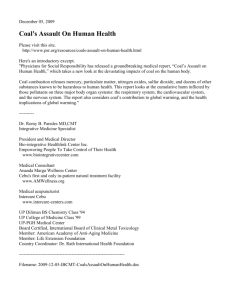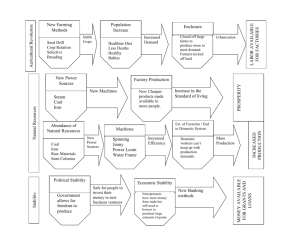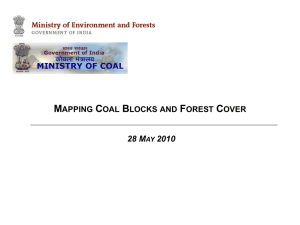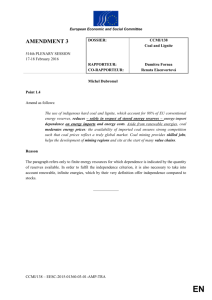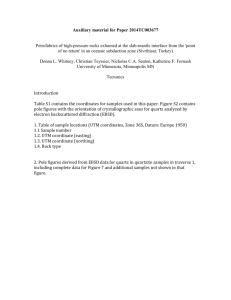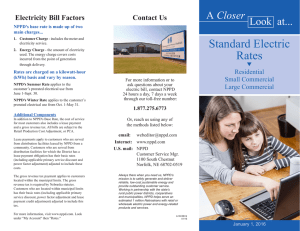Document
advertisement
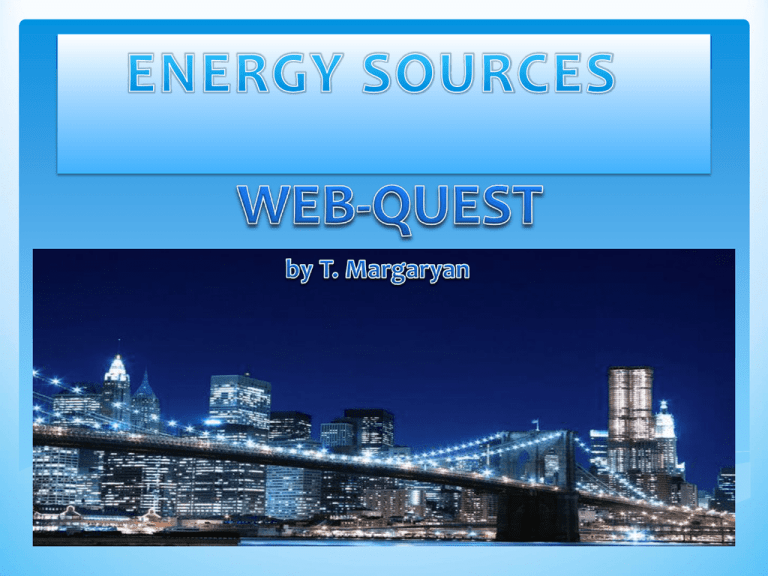
In this web-quest you will search different energy sources; estimate their advantages and disadvantages; consider other people’s opinions evaluate this information. What do you know about energy sources? What type of heating do you have at home? Where does electricity come from? What kind of transport do you use to get to the University? What are the problems in energy security? What are their solutions? What do you know about different types of energy sources? Click on the links below to find the answers to the question. You might also use online dictionaries, online concordance online thesaurus http://www.bbc.co.uk/climate/adaptation/wind_power. shtml http://www.wired.com/news/technology/0,1282,46522, 00.html http://www.nppd.com/about-us/power-plantsfacilities/wind-generation/ How does wind generate the energy? What do some people not like about the turbines? Why are wind turbines being built in Antarctica? http://electric-power-plant.blogspot.ru/2010/03/hydropower-plant.html http://www1.eere.energy.gov/water/hydro_plant_types.ht ml http://www1.eere.energy.gov/water/research.html Who was the first to have used the power of water? What are the types of hydro power plants? What are the targets of the Water Power Program? What kind of industries use the river power? http://www.oilcrisis.com/overview.htm http://arcticcircle.uconn.edu/ANWR/ http://www.anwr.org/Video/Senator-Stevens-ConfrontsCongress-for-Blocking-Oil-Exploration.php http://seawifs.gsfc.nasa.gov/OCEAN_PLANET/HTML/peril_ oil_pollution.html http://www.whitehouse.gov/share/two-very-importantlines?utm_source=email&utm_medium=email&utm_conte nt=email260-graphic&utm_campaign=energy http://www.gulfoilandgas.com/webpro1/Projects/default.a sp?nid=RU http://www.youtube.com/watch?v=hiHghN7_46U What are some hazards of oil use? What are the advantages of its use? COAL http://www.fossil.energy.gov/education/energylessons/ coal/coal_history.html http://www.planetark.com/enviro-news/item/70383 http://www.planetark.com/enviro-news/item/70380 http://www.nppd.com/about-us/power-plants-facilities/ What was coal originally? When and where did coal start to be used on a big scale? What measures are being taken to prevent coal combustion impact on the environment? GAS http://www.nppd.com/about-us/power-plants-facilities/ http://www.fossil.energy.gov/education/energylessons/ gas/gas_history.html http://rt.com/business/iran-russia-gas-oil-projects-029/ http://www.planetark.com/enviro-news/item/70385 http://www.gulfoilandgas.com/webpro1/Projects/defaul t.asp?nid=RU What was gas used as a fuel for in the 1800s? When were most gas pipelines built? What are the problems in energy security? What are their solutions? NUCLEAR POWER http://www.bbc.co.uk/climate/adaptation/nuclear_power.shtml http://www.world-nuclear.org/info/Country-Profiles/Countries-OS/Russia--Nuclear-Power/ http://www.planetark.com/enviro-news/item/70392 http://www.world-nuclear.org/info/Country-Profiles/Countries-GN/Japan/ http://www.nppd.com/about-us/power-plants-facilities/coopernuclear-station/ What is the total capacity of Russian, Britain nuclear power plants? What are the advantages and disadvantages of nuclear power? SOLAR POWER http://www.bbc.co.uk/climate/adaptation/solar_power. shtml http://www.planetark.com/enviro-news/item/70389 When did solar power first start to become popular? What countries efficiently use solar power? TASKS Pretend you are members of the international team designing a power plant for your country. 1. Choose your country from the list: Russia, Great Britain, the USA, Australia, Sweden, Germany, China, Venezuela, Japan 2. Decide your criteria to design a power plant: • Renewability: how long will this source be around? • Cost: is the source financially possible? • Aesthetics: how will it look? • Performance: will it produce enough energy? • Safety: can anyone get hurt? • Impact: on wildlife, on the environment, on people. After you have chosen your points, put them in the order of importance for you. 3. Interview your group mates or family members based on the above criteria. Which one do they think is the best? Which one is the worst? 4. Search on the Internet (URLs given) to find the opinion of a public person, government, or other interested parties 5.List at least 2-3 advantages and disadvantages for each energy source. 6. Report your results to your team members at the roundtable talk Which source is the best for your country? Give reasons why, providing information you have collected from this project. 7. Write a survey for the journal 1. 2. 3. 4. 5. What source of energy have you chosen? How is it generated? What is its industrial and every day application? What are its advantages and disadvantages? Does it affect the environment? How? Use the active vocabulary of Unit 3 (p. 46) Self-evaluation: What did you learn in this web-quest? What did you like most of all about it? What would you like to change or improve? Your feedback at: sunnymood77@hotmail.com would be greatly appreciated! TEACHING NOTES & EVALUATION Refer to this evaluation form when evaluating students' work below standard Survey standard 6-7 (4/3; 3/4;3\3) disorganised and clearly written, difficult to follow; logically organised, little data, few including a conclusions; representative range intrusive errors of of facts and some vocabulary and conclusions; but grammatical and grammar lexical mistakes impede overall intelligibility above standard 8 -9 (5/4; 4/5; 4/4) outstanding 10 (5/5) carefully planned engaging, original and well and checked organised text, consisting text, including of introduction, data introduction; a (extensive) and conclusion. good range of No errors of grammar or data, and vocabulary; consistent and conclusions; appropriate style; logically linked illustrative diagrams or and accurate in charts might also be terms of included grammar and lexis; good rage of vocabulary displayed but some mistakes Report below standard standard 2 3 report is confused and/or short and/or difficult to follow, poorly researched and/or minimally exemplified; intrusive errors of vocabulary and grammar and/or large chunks copied directly from websites above standard 4 outstanding 5 report is basic report is report is exceptionally but sufficient to thorough and well argued, present main clearly laid out, demonstrating original, arguments; with arguments often committed, divided into clear convincingly thinking based on sections and made on the thorough research, generally easy to basis of well expressing a range of follow; research researched data; points of view but not exhaustive research has reaching clearly but sufficient gone beyond the articulated and and mainly most obvious accurately expressed original; sources and conclusions grammatical and there is ample lexical mistakes evidence of do not impede original thinking overall and writing; high level of accuracy intelligibility and a broad lexical range 2 Presentation presentation simply read aloud; not easy to follow, poorly illustrated, and/or underrehearsed; work not well distributed between group members; little apparent liaison or collaboration 3 4 presentation well organised organised into presentation, stages, clearly with clear and illustrated and detailed sufficiently rationale, detailed to give a showing general idea; evidence of evidence of thorough rehearsal and research and sufficient group rehearsal; collaboration, attractively even if workload illustrated; work not evenly well codistributed; ordinated and some reading evenly aloud, but some distributed; improvised some reading aloud, but some “telling” improvised “telling” 5 presentation painstakingly researched but presented in an engaging, even entertaining, way; technically impressive, well resourced; even distribution of work, each contribution harmoniously linked to make a coherent whole; report delivered with notes but not read aloud; questions handled effectively and spontaneously CONCLUSION This Web-Quest has introduced learners to the concept of alternative energy sources, and of how to use World Wide Web English-language resources critically in order to become better informed about the repercussions of using current energy sources. They have had to collaborate (in a group course) to design and present an original list of advantages and disadvantages of energy sources, along with an investigative report justifying their decisions. This has required the synthesis and organization of data in an original way. They have also had to work individually to report on a survey. Finally they have had to engage self-appraisal skills in order to evaluate their progress and participation in the tasks.


